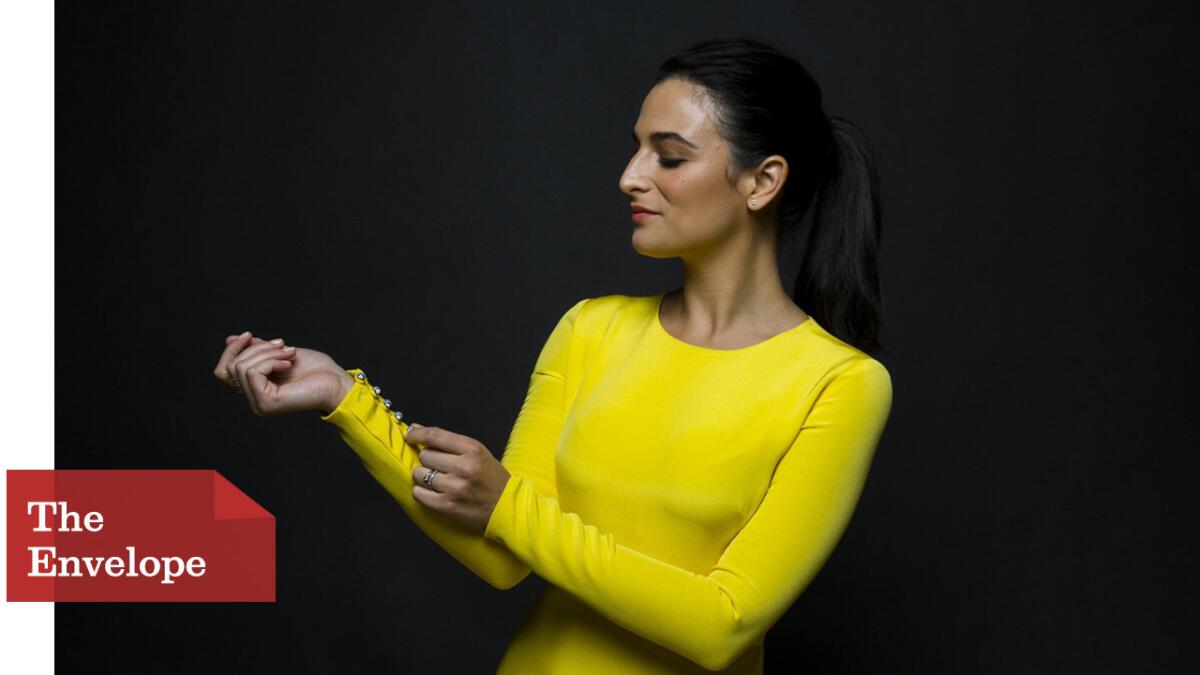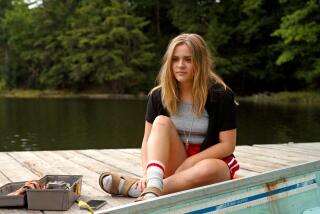The Envelope: Jenny Slateâs âObvious Childâ aims to deliver a beating heart

Arriving on the dot for coffee and a chat in Los Feliz, 32-year-old actress, stand-up comedian, writer and one-woman multimedia phenomenon Jenny Slate lines up for her caffeine in an elegant cream-colored summer dress accented with bright flowers. She crouches to ruffle the head of a friendly dog before settling in to talk about her breakout movie role this year in the Sundance indie âObvious Child.â
Slateâs character, Donna Stern, is an under-employed Brooklyn stand-up whose one-night stand with an unexpectedly nice guy leads to an unexpected pregnancy, and she decides to get an abortion. The film, written and directed by Gillian Robespierre, is tough stuff with unexpectedly funny moments â or funny stuff that gets tough.
Slate is also busy with regular TV appearances â âParks and Recreation,â âBobâs Burgers,â âBrooklyn Nine-Nineâ â as well as her bestselling books and madly popular YouTube videos made in collaboration with her husband, Dean Fleischer-Camp, that star Marcel the Shell With Shoes On, a talking snail-shell with tiny shoes and a huge heart.
Is âObvious Childâ a comedy or a drama about a very funny young woman?
I think itâs a comedy ... but I think that weâve come to expect very little from our comedies in terms of how much they should remind us that we have beating hearts. I think if I were just playing Donna as sort of a normal, stereotypical lead in a romantic comedy, I would feel uncomfortable because I would feel that eventually all of my little squiggles and doodads and dents would show.
Thereâs a lot of âObvious Childâ where you have to work in, or with, silence. What was that like as someone coming from stand-up, which is such a verbal form of performance?
It was all a fun challenge, especially because Iâve waited so long just to have a part that has some dimension to it. But as a stand-up comedian, silence is the thing that youâre the most afraid of â thatâs not what the art form is. But I donât identify as a stand-up comedian. I started doing it in the hopes someone would see me and say, âThis feels like an actress with some gusto.â I really wanted those challenges; it was delightful, and it required a lot of focus.
A lot of new comedy is based on irony or meanness, but âMarcel the Shell With Shoes Onâ is, while occasionally melancholy, a thing of joy and sincerity. Where does that come from?
I think we became exhausted by comedy that was all about saying âAwwwwwwk-ward!â or comedy that is rough without having a heart. I know that Iâm motivated to do comedy out of both self-love and self-doubt ... and I was interested in comedy that reflects a fuller human experience without being pathetic or sappy. And how hard it is, sometimes, to accept sincerity. And especially after working at âSaturday Night Live,â I just wanted to assert that thereâs not one way to be truthful, and thereâs not one way to relay that the experience of being in our world is both exciting and really heartbreaking sometimes. Itâs all in the presentation.
Have you been approached at screenings by audience members who want to share their take on Donna and her choice?
What is interesting to me is the people who are mid- to late 20s who come up to me, men and women, saying, âI was really into Donna, and she makes a bunch of mistakes â but sheâs not hideous.â Sheâs not a pariah. Sheâs a rumpled delight.
And perfect people are boring.
Usually, for the audience to really invest in a romantic leading lady sort of thing â I mean, our movieâs more than that but at this point, that person has to be flawless, and who wants that? I donât want that. At all.
More to Read
From the Oscars to the Emmys.
Get the Envelope newsletter for exclusive awards season coverage, behind-the-scenes stories from the Envelope podcast and columnist Glenn Whippâs must-read analysis.
You may occasionally receive promotional content from the Los Angeles Times.










